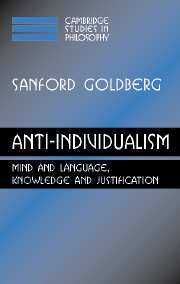Book contents
- Frontmatter
- Contents
- Preface
- Introduction
- Part I SEMANTIC ANTI-INDIVIDUALISM
- Part II EPISTEMIC ANTI-INDIVIDUALISM
- 5 The epistemic dimension of knowledge communication: towards an anti-individualistic approach
- 6 The objection from gullibility
- 7 The objection from rationality
- 8 Towards an ‘active’ epistemic anti-individualism
- References
- Index
8 - Towards an ‘active’ epistemic anti-individualism
Published online by Cambridge University Press: 22 September 2009
- Frontmatter
- Contents
- Preface
- Introduction
- Part I SEMANTIC ANTI-INDIVIDUALISM
- Part II EPISTEMIC ANTI-INDIVIDUALISM
- 5 The epistemic dimension of knowledge communication: towards an anti-individualistic approach
- 6 The objection from gullibility
- 7 The objection from rationality
- 8 Towards an ‘active’ epistemic anti-individualism
- References
- Index
Summary
INTRODUCTION
From the results we have so far in Part II, considerations pertaining to knowledge communication support a rather substantive rethinking of the central epistemic statuses mentioned above. In particular, given the role of condition (a), the reliable testimony condition, on testimonial knowledge, we arrived at anti-individualistic results regarding the nature of knowledge, warrant, justification, and rationality. The arguments for these results suggest that, when it comes to the epistemic status of a hearer's (testimonial) belief, the relevance of her linguistic peers is seen in the epistemic properties of the peers' testimonies – in particular, in the epistemically relevant properties of the cognitive processes that underwrite the formation and sustainment of the beliefs expressed in those testimonies. But for all these arguments have to say, this exhausts the epistemic relevance of the hearer's linguistic peers: once we specify the (epistemically relevant) properties of the testimonies upstream in the chain of communication, and those (epistemically relevant) properties related to the process of social scrutiny, we have exhausted the anti-individualistic considerations relevant to the epistemic status of the hearer's (testimonial) belief. The overarching aim of this chapter is to show that the anti-individualistic character of the epistemic dimension of communication involves even more than this. In particular, my thesis will be that there are cases in which a hearer S satisfies condition (c), the reliable discrimination condition, only if we assume that the relevant credibility monitoring is performed for her by others.
- Type
- Chapter
- Information
- Anti-IndividualismMind and Language, Knowledge and Justification, pp. 200 - 238Publisher: Cambridge University PressPrint publication year: 2007



